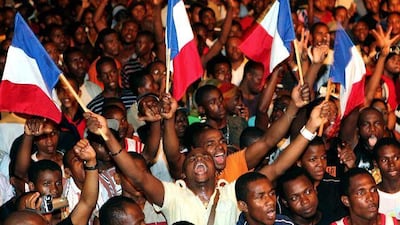JOHANNESBURG // France grew bigger at the weekend, as the inhabitants of the small island of Mayotte, a speck in the Indian Ocean between Mozambique and Madagascar, voted to become the country's 101st departément. The poll, by a margin of more than 95 per cent, is the culmination of a process that began almost 170 years ago, when French settlers first landed on the island, but it is also a demonstration of the enduring legacies of colonialism in Africa.
The key change in becoming a departément d'outre-mer will be to give precedence to French law on the island - at present French legislation has to be specifically extended on a case by case basis to cover Mayotte, while once the process is completed the reverse will be the case. Until now Mayotte, which is majority Muslim and where fewer than half the 200,000-odd population speak French, has maintained a degree of internal autonomy, with Sharia law covering some aspects of social relations. It will instead be superseded by the French legal code, therefore banning polygamy and raising the marriage age from 15 to 18, prompting opposition from some Islamic clerics.
But that was outweighed in the referendum by the fact that the inhabitants, known as Mahorais, will eventually be fully eligible for French social security benefits - the main driver of support for the vote, which was backed by all of Mayotte's political parties. "Our elders fought so that we we could remain part of France. It's up to us to finish that work," Youssoufou Majouai, 39, told Agence France- Presse in Mamoudzo, the capital of the 374 sq km island.
"We have wanted this for a long time, to be like mainland France, with good schools and good salaries," added Inoussa Abdallah. During the era of empire, Paris sought to put a moralistic gloss on its acquisition of territory, claiming it had a "mission civilisatrice" to bring the benefits of development to the poverty-stricken peoples of Africa and elsewhere. Officially it saw its colonies as part of a greater France itself, rather than mere overseas possessions, and French citizenship was granted to those of their inhabitants who were "assimilés", or assimilated, enabling them to vote in general elections. The colonies sent representatives to the parliament in Paris, albeit in tiny proportions relative to their total population, and after the Second World War suffrage was extended further.
In 1975, as the rest of the Comoros islands voted for independence from France, little Mayotte rejected the option, and since then has enjoyed varying status within the republic, culminating in the designation of "overseas collectivity". The change will also give the European Union an extra strategic toehold of territory in the Indian Ocean, to add to the French island of Reunion, already a departément d'outre-mer, as Mayotte's status switches from being an EU "Overseas Country and Territory" to an "Ultra-Peripheral Region", on a par with Portugal's Azores or Spain's Canary Islands.
France's President Nicolas Sarkozy welcomed the result, in terms that harked back to the aspirations of centuries past, with his office saying in a statement that it was the realisation of a dream maintained over several generations and the culmination of a desire expressed for 50 years. "This is a historic moment for Mayotte and the Mahorais," he said. But the vote has not been without controversy in Africa, where colonialism is still often a sensitive subject and where borders were largely laid down by European powers ignoring demographics on the ground.
The Comoros maintains a claim on Mayotte, which it regards as under foreign occupation, and it condemned the poll, as did the African Union, while David Zounmenou, of the Institute for Strategic Studies in Pretoria, added that it could endanger the principle of territorial integrity in Africa. "This can also affect separatist movements in the rest of the continent," he said. In France, the NGO Survie claimed it was a violation of international law and "the pure and simple annexation of Mayotte by France".
"Paris must end the illegal occupation of the Comoros, and stop preventing Comorians from seizing their own history," it said. Nonetheless the Mahorais only have to look across the waves to see what they have avoided. The rest of the archipelago, the three islands that voted for independence in 1975, could be regarded as the classic example of an African basket-case. There have been at least 20 attempted or actual coups d'etat since the Comoros became a nation of its own, and for years the French mercenary Bob Denard was a pivotally important figure in the islands' politics.
They have separatist issues of their own, with the leader of the island of Anjouan, Mohammed Bacar, declaring it independent in 2007, prompting a sea blockade and ulitmately an invasion by Comorian forces in February last year. Comorians remain deeply poverty-stricken, and every year thousands of them try to cross to Mayotte - where GDP per capita is far higher - sometimes drowning in the seas between the islands.
In an apologia for the decades-long shambles, Survie blamed Paris for the Comoros' woes, saying it had been "politically dismembered through a series of coups d'état organised by French mercenaries who frequently use Mayotte as their base". "This explains the country's extreme economic weakness," it added, and despite the principle of self-determination, condemned "the strategy employed by France to keep Mayotte ? to maintain a standard of living on the island superior to the rest of the Comoros archipelago, so that the inhabitants prefer French administration to definite decolonisation".
sberger@thenational.ae

